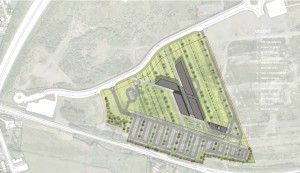Leading architect Willie Watt argues that the current system of procurement in Scotland damages the economy and hinders efforts to regenerate communities.
Systemic problems
This is a fairly unique problem, because most people agree there is a problem. Whether you ask a bidder from the private sector or an assessor in the public sector, a small practice in Stornoway or a multi-national in Glasgow, everyone says: the procurement system must change!
From that point of view, the Cabinet Secretary for Infrastructure and Capital Investment’s announcement of the Scottish Government’s review of Construction Procurement is most welcome. Its ambition appears to be detailed and wide ranging and neatly complements the more general consultation process that is intended to lead to the Procurement Reform Bill.
The UK, and with that, Scotland, are at the wrong end of European league tables for procurement costs, inertia and the lack of involvement of smaller businesses. These systemic problems are well documented in PwC’s ‘Public Procurement in Europe’ 2011 report to the European Commission and a wide number of papers prepared by representatives of the construction professions and the wider industry itself. Our economy is suffering.
A feeding frenzy for busy fools
In today’s construction industry there are many ‘busy fools’ chasing their tails, bidding for everything, everywhere. But at the same time, frameworks are challenging micro, small and medium sized businesses, there are huge problems caused by the geographic displacement of work, there is no such thing as ‘local jobs for local workers’ and new businesses cannot get a foot onto a ‘ladder of opportunity’.
Instead, they are faced with a jump onto a swirling helter skelter which is the bidder’s public marketplace. Whilst the Scottish Government’s instigation of the Public Contracts Scotland internet portal has many good points which need to be praised, its unmitigated use for smaller and smaller projects does mean that certain projects are now too visible, thereby instigating a disproportionate ‘feeding frenzy’ by bidders.
In the construction industry, you might have 50-60 bidders, or maybe even as many as 300 bidders, clogging the system. Yet 58% of businesses in this sector do not bid because they feel ‘locked out’, and feel that there is no point bidding. The whole ecosystem is therefore disfigured, dysfunctional and skewed. The system is currently ‘padded out’ by repeat questions relating to matters of Corporate Governance, which are generally aimed at a much, much larger corporate world, and which swamp out all other considerations. Indeed, many such questions relate to strict legal obligations that the bidder must meet in terms of their tax, health and safety, employment, and other such matters. At present, assessors must mark each of these questions in each and every bid, at a huge cost to every public sector organisation up and down the country.
The system is currently ‘padded out’ by repeat questions relating to matters of Corporate Governance, which are generally aimed at a much, much larger corporate world, and which swamp out all other considerations. Indeed, many such questions relate to strict legal obligations that the bidder must meet in terms of their tax, health and safety, employment, and other such matters. At present, assessors must mark each of these questions in each and every bid, at a huge cost to every public sector organisation up and down the country.
No human quality
At present in the UK, the public sector is increasingly seeking to select consultants and contractors by a style of written examination that focuses almost purely on corporate governance. This is an unhealthy state of affairs, particularly wherever knowledge and brain power are being purchased.
Furthermore, bid costs and the complexity of the system are dehumanising and frustrating thereby creating a culture of legal challenge. This is a vicious circle which simply fuels ever more complexity and ever greater costs.
Fundamentally, it lacks the human touch. To what effect?

The Scottish Crime Campus in Gartcosh, North Lanarkshire, was tendered through Public Contracts Scotland
We understand that it can cost the public sector £70k to award a £130k contract and research underlines that it can cost the private sector £250k to bid for that work.
Is that delivering value or quality? Is it good for OUR economy? Is it good for the regeneration of OUR communities?
Clearly it is not. It is just plain wrong. It is a waste of money, time and energy!
It is a distraction to the public sector and a drain on their valuable resources. The private sector, depleted by five years of recessions, cannot afford to keep making such levels of worthless investment. It is sapping our national drive and spirit.
Rebuilding the foundations
Solutions, though, are available if we can adopt a ‘can do’ mindset. But the devil in this case will be well and truly in the detail.
In that regard, I believe we must create a ‘people and knowledge’-centred model. After all, great architecture, great buildings and the regeneration of our communities are delivered by people who have had the skills and empathy to deliver their client’s vision.
In this instance, clients are not buying celery or paper clips. Ultimately, clients want to select people with whom they can easily work through thick and thin. They want people who will be creative and people who will protect their interests.
Above all, they most probably want people on the ground who will rebuild communities from the inside whereby their businesses add to the economic vibrancy of the community itself.


